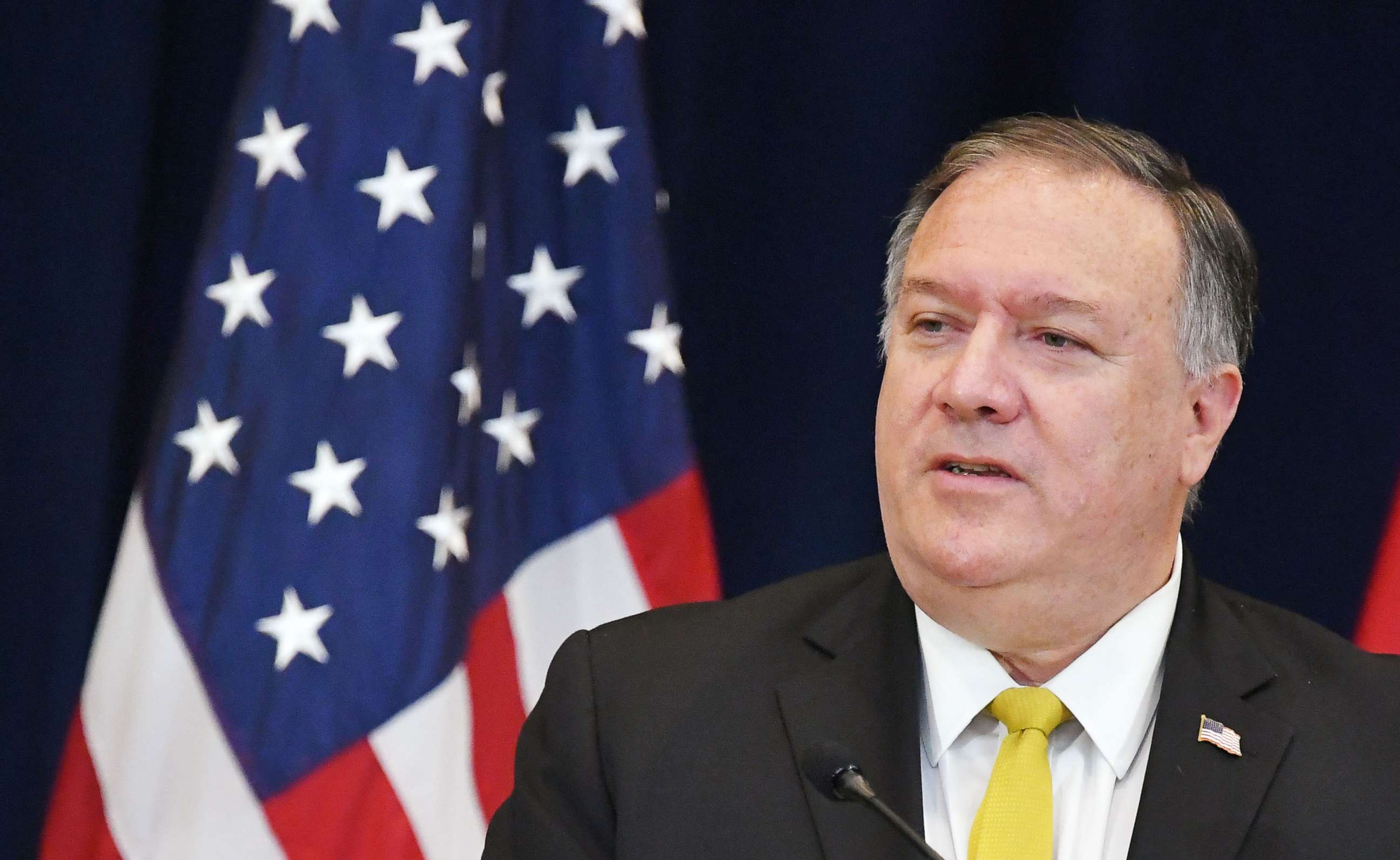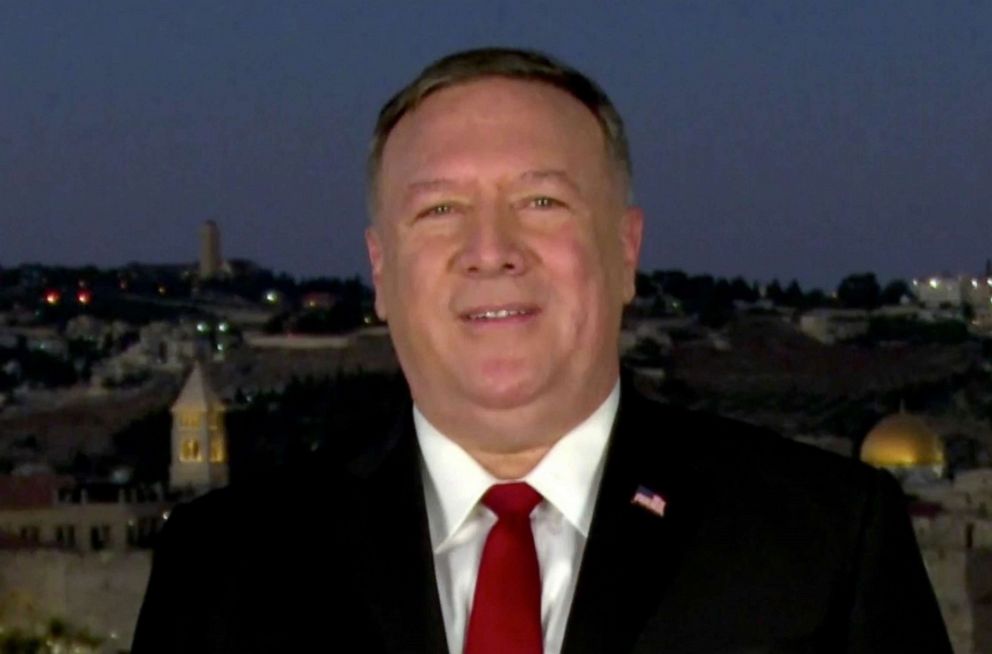Ahead of Senate runoffs, Pompeo travels to Georgia for politically tinged speech
It's another foray into domestic politics for the top U.S. diplomat.
Never shy of diving into domestic politics, Secretary of State Mike Pompeo will travel to Georgia for a speech on Wednesday, just weeks ahead of the state's critical Senate runoff races.
The speech at Georgia Institute of Technology will focus on China and the series of actions by the Trump administration to permanently alter the U.S. relationship with China and box President-elect Joe Biden into a corner.
Pompeo's remarks will focus on the "China challenge to U.S. national security and academic freedom," according to the State Department. Pompeo has led the charge in a series of actions in President Donald Trump's lame-duck session to tighten the screws on Beijing and sever ties between the U.S. and China.
Critics warn the steps threaten to put the two major powers on a path to deeper distrust, separate economic systems, and higher tensions.
But the Senate races will loom large over his appearance, which seems to be Pompeo's intention. Control of the U.S. Senate will be determined by the two competitive races, with Trump campaigning in the state this past weekend.

The top U.S. diplomat has repeatedly inserted himself into domestic politics -- bashing Democratic lawmakers, speaking to the Republican convention and Christian right groups, and taking on culture war topics.
"This adds to Pompeo's list of highly partisan, political actions," the watchdog group American Oversight said. "Pompeo’s decision to go to Georgia further suggests the administration continues to be shameless about using their positions for political ends."
The Office of Special Counsel is investigating Pompeo for violating the Hatch Act, which forbids the use of federal office for political gain, including for his speech to the Republican National Convention in August. That appearance broke precedent, his own internal policy, and perhaps even the law, according to ethics experts.
It was one of several politically-tinged appearances in the run-up to the 2020 presidential election, including a visit to the Wisconsin state capitol and a speech to the Florida Family Policy Council, a Christian group that sold $10,000 tickets for a meet-and-greet with Pompeo.
Pompeo has denied that his domestic appearances are related to politics, instead saying they’re focused on making the American public more aware of the work of the State Department.

Pompeo's political future has been the topic of much speculation throughout his tenure in the Trump administration. One of Trump's closest advisers who has worked with him from the start of his administration, Pompeo told the Wall Street Journal in an interview Sunday that he and his wife intend to return to Kansas after the administration ends -- his adopted home state where he once served as a member of the House and from where he is likely to launch his next act -- including a possible presidential campaign in 2024.
Pompeo has yet to clearly acknowledge Biden's victory in the 2020 election, although his agency is formally working with Biden's team on the transition. But even as that work begins, he is leading the charge on a host of changes to U.S.-China policy that will have lasting impact.
Late Friday night, he announced that the U.S. would cut five cultural exchange programs with China that are designed to foster open relations, academic exchange, and people-to-people ties. But Pompeo cast that as wrong, calling them "PRC-funded propaganda programs" in "disguise" that only provide "carefully curated access to Chinese Communist Party officials, not to the Chinese people."
In a move that will likely have an even deeper impact, Pompeo announced earlier on Friday that the U.S. will restrict American visas for Chinese citizens that are members of the Communist Party or its United Front Work Department. His statement didn't provide details -- such as how many people this will affect or what kind of restrictions -- but he accused Chinese officials of using "coercion and intimidation tactics to suppress freedom of expression," especially among the Chinese diaspora, in the U.S. and elsewhere, including "physical violence," doxing, and "sabotage."
The Pentagon also added two top Chinese firms to its blacklist of alleged Chinese military companies last week. There is no immediate penalty with the move, but Trump signed an executive order last month that allows him to bar U.S. investment in any blacklisted Chinese companies -- 35 firms in total now, after DOD added China's top chipmaker SMIC and oil giant CNOOC on Thursday.
The Treasury Department also took new steps on Monday, unveiling economic sanctions and visa bans against 14 Chinese officials on the National People's Congress Standing Committee, the top legislative body in Beijing, for their role in crafting Hong Kong's national security law. That law, which tightened Chinese control over Hong Kong, has ended the territory's special status under U.S. law. It also gave authorities the power to expel four pro-democracy lawmakers -- which Monday's sanctions are in response to.
In a statement, Pompeo accused the 14 vice-chairpersons of "gutt[ing]" Hong Kong's legislature and "rendering the body a rubber stamp devoid of meaningful opposition."




